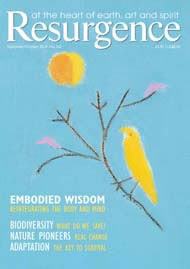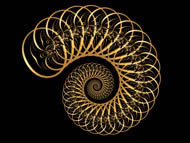One of the most memorable experiences of my life took place in a biology lesson when I was about 13-years-old. It was one of the first warm, sunny days of spring. So when our teacher, Mr. Pope, announced that class would be held outside, we were all excited. We ran into the school grounds and assembled underneath a magnificent horse chestnut tree which was already covered with bright green leaves and showy white flowers.
The lesson was on photosynthesis. Asking us to look up at the new growth above our heads, Mr. Pope enthusiastically described how plants use sunlight, water and carbon dioxide to make sugar, oxygen and energy. I was captivated by his words and by the soft, dappled light filtering through the leaves. As I listened, I realized that science had a way of explaining the tree’s loveliness that aroused an ineffable experience in me - an overwhelming sense of awe.
Science has always had the capacity to evoke awe. Indeed, one of its most important gifts has been the ability to nurture a feeling of reverence for life. Early astronomers such as Copernicus and Galileo looked up and proclaimed the majesty of the universe. It is said that when Galileo discovered he could use mathematics to understand the motion of celestial bodies he felt that he had learned the language of God. At the other end of the scale, Antonie van Leeuwenhoek, the father of microbiology, looked down the first microscope and declared his wonder at the previously unseen world of bacteria, protozoa and algae. And in our own time, who has not been moved by the exquisite symmetry of DNA’s double helix or the spectacular images of distant galaxies created seconds after the Big Bang?
But over the centuries science has lost many of its more ‘spiritual insights’ and ceded this territory back to religion. By disowning its principal revelations – the immensity of space and time, the interdependence of all living things and the preciousness of life – science threatens to return us to the grip of the religious belief systems that dominated Western culture before the 16th century. Its insistence on separating the sacred from the material world has encouraged us to build a psychological wall inside ourselves. This makes no sense to me. If religion is concerned with life’s ultimate truths and science is the never-ending search for truth, then what could be more profoundly sacred than science?
The truth is that science has become increasing pragmatic and functional over the centuries. Largely abandoning its ability to inspire awe, it is now Western culture’s chief problem-solver. Today, science’s primary purpose is to provide answers to many of the most serious challenges facing society. Whether it’s global warming or the latest disease pandemic, we look to science and its daughter – technology – for solutions. And their responses have been remarkably effective. Mostly funded by government agencies and corporate interests, science and technology have significantly improved the quality of human life. For instance, the average human lifespan has increased by more than forty years in the past century alone. This impressive record of achievement has transformed science into a belief system that is now worshipped like a religion.
As it has assumed the role of chief problem solver, science has lost much of its capacity to evoke awe and wonder. Although it can generate exquisitely beautiful images of just about anything, science has become increasingly short sighted and limited. Preoccupied with narrowly defined technical problems, many researchers have closed their eyes to unfettered curiosity and open-ended inquiry about life. Why has this happened? It has happened because science has lost its commitment to deep observation.
During the Scientific Revolution and for about three centuries afterwards, deep observation played a central role in the natural sciences. Just think of Redouté’s exquisite paintings of roses, lilies and other flowers, John Audubon’s delicate illustrations of North American birds or Charles Darwin’s thoughtful narrative of the wildlife, geology and people he encountered during the voyage of HMS Beagle. They would not exist without deep observation. But today, few descriptions of the scientific method include this essential practice. Emphasizing hypotheses, experimentation, quantification and reasoning, many modern science textbooks ignore the importance of observation completely.
Observation isn’t just about seeing. It’s also about using all our sense organs – listening with our ears, smelling with our noses, feeling and touching with our skin and tasting with our tongues. The most complete observation requires total attention. It is about immersing one’s whole self in the experience of discerning the other. At this level, observation is about understanding with our hearts as well as our heads. In the process, the separation between subject and object blurs. The observer becomes connected with the observed and a relationship is forged between them. Indeed, it is only through our senses that we can create and sustain relationships. According to author David Abram, “Humans are tuned for relationship. The eyes, the skin, the tongue, the ears, and nostrils – all are gates where our body receives the nourishment of otherness”. Nature writers such as Annie Dillard, Gary Snyder, Wendell Berry and Barry Lopez understand this well. Their work is chock full of sensory awareness and insightful reflection. But this type of observation is almost entirely lacking from contemporary science. As Sherlock Holmes said to Dr. Watson “You see but you do not observe.” Today, science is seeing but it is not observing. And without the willingness to fully observe life, science is unlikely to grasp its true splendor.
Why is this important? The reason will be obvious to the readers of this magazine. The more science is aware of the magnificence of life, the more our culture will want to protect it. The more we appreciate nature’s beauty, the more we will want to defend it. The more we are conscious of the myriad forms of life, the more we will want to safeguard them from harm. The truth is that deep observation and the resulting experience of wonder could change humankind’s relationship the other-than-human world and help us to behave more responsibly. In other words, by recovering its capacity to evoke awe, science could accelerate the transition to sustainability.







